ESSA's accountability system requirements indicate that states must include multiple measures, use a continuum of readiness indicators, and provide usable data for educators. Meaningful data includes measures and data formats that enable educators to track students' progress toward college and career readiness and to make adjustments to educational inputs. The following resources provides guidance on meaningful college and career readiness measures and indicators.
ESSA requires states to identify high schools with a graduation rate less than 67% as low performing. Early warning indicators are used to identify and intervene with students early to help them get back on track and meet major educational milestones, such as on-time graduation. Early warning system indicators are an evidence-based strategy available to struggling high schools.
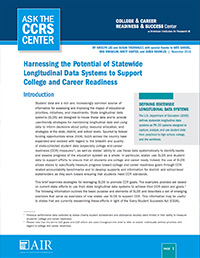 Harnessing the Potential of Statewide Longitudinal Systems to Support College and Career Readiness | November 2016
Harnessing the Potential of Statewide Longitudinal Systems to Support College and Career Readiness | November 2016
Statewide longitudinal data systems (SLDS) offer states a powerful tool to observe trends, assess needs, and develop and refine policies that promote college and career readiness initiatives. In this Ask the CCRS Center brief, we discuss strategies for leveraging SLDS to promote state-defined college and career readiness goals.
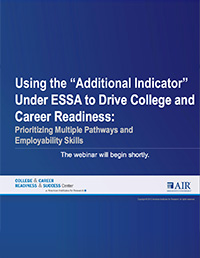 Using the "Additional Indicator" Under ESSA to Drive College and Career Readiness: Prioritizing Multiple Pathways and Employability Skills | October 2016
Using the "Additional Indicator" Under ESSA to Drive College and Career Readiness: Prioritizing Multiple Pathways and Employability Skills | October 2016
ESSA provides states an opportunity to better integrate their college and career readiness priorities, including employability skills and multiple pathways to postsecondary success, into their accountability systems. During this recorded webinar, presenters discuss strategies for including more meaningful, actionable, and college and career ready focused measures as the “additional indicator of school quality or student success” in their accountability systems.
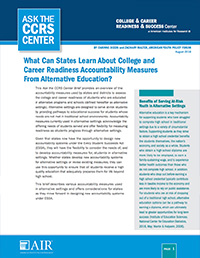 What Can States Learn About College and Career Readiness Accountability Measures From Alternative Education? | August 2016
What Can States Learn About College and Career Readiness Accountability Measures From Alternative Education? | August 2016
ESSA provides states the opportunity to revise or design new accountability systems that include measures for all students, including at-risk students participating in alternative education settings. This Ask the CCRS Center brief provides states with concrete examples of accountability measures used in alternative education settings in three major categories: (1) readiness to receive education, (2) demonstration of learning, and (3) readiness for college and career.
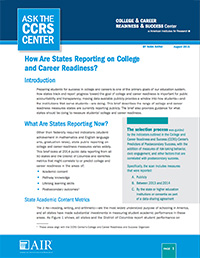 How Are States Reporting on College and Career Readiness? | August 2015
How Are States Reporting on College and Career Readiness? | August 2015
How are states tracking and reporting progress on college and career readiness using meaningful data as required by ESSA? This brief describes the range of college and career readiness measures that states are currently reporting publicly and recommendations to improve measures.
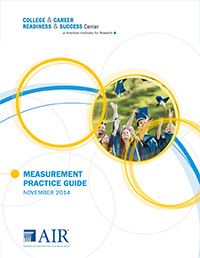 Measurement Practice Guide | November 2014
Measurement Practice Guide | November 2014
This discussion guide is designed to help states develop meaningful data by define measurement goals, select college and career readiness measures and indicators designed to support those goals, and use the data gathered with those measures and indicators to make informed decisions about college and career readiness policies, programs, and interventions.
 Outcomes and Measures for College and Career Success: How do We Know When High School Graduates Meet Expectations? | May 2012
Outcomes and Measures for College and Career Success: How do We Know When High School Graduates Meet Expectations? | May 2012
This brief summarizes the outcomes and measures of college and career success into three key threads: 1) On-track indicators; 2) Attainment and authentication; 3) Accountability and improvement feedback. The brief concludes with key factors that schools, districts, and states may want to consider as they begin to build, analyze, and address meaningful measures and outcomes specific to college and career readiness in their contexts.
